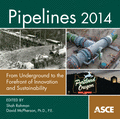Utilizing Info-Gap Decision Theory to Improve Pipeline Reliability: A Case Study
Publication: Pipelines 2014: From Underground to the Forefront of Innovation and Sustainability
Abstract
Info-gap decision theory, a tool for evaluating severe uncertainty, can be of tremendous value for managing risk and assessing the vulnerability of water conveyance systems in areas of high seismicity. In those areas, significant consequences can result from decisions made with a profound lack of information, such as the uncertainty of seismic loading, unknown performance of pipelines and other infrastructure, unknown costs to repair seismic damage, and unknown societal impacts from downtime following an event. Info-gap is a tool for making good decisions with very little information and recognizes up front that our best projections of the future may be wrong. Thus, rather than seeking a solution that is optimal for that projection, info-gap seeks a solution that works reasonably well for all plausible conditions. In other words, info-gap seeks solutions that are robust in the face of uncertainty. EBMUD is currently using info-gap to gain insight into possible solutions for providing reliable water service to an island community within its service area. The island, containing about 75,000 customers, is particularly vulnerable to water supply disruption from earthquakes, because it has no water storage on the island and is entirely dependent on four potentially fragile water transmission mains under the waterway for its day-to-day water supply. Info-gap analysis is being used to evaluate competing tunneling strategies for supplying water to the island. Horizontal directional drilling and microtunneling alternatives are being evaluated for their ability to survive a major earthquake and for speed of repair should they be damaged by an earthquake. The analysis considers not only the expected results for each alternative but also the worst-case performance of each alternative under varying levels of uncertainty. Thus, the info-gap model is a tool for evaluating the level of reliability each mitigation buys, even in the face of significant uncertainty. This analysis is improving the quality of the planning process, because it can identify strategies that ensure minimal disruption of water supply following a major earthquake, even if the earthquake and resulting damage fail to conform to our expectations. The model results prompt discussion regarding how much mitigation is desired, or expected to be reliable enough, even in the face of great uncertainty regarding the damage. Results of the study are presented, including a discussion of how info-gap model results complemented existing tools for comparing alternative strategies and how info-gap improves our ability to quantify our tolerance for uncertainty.
Get full access to this article
View all available purchase options and get full access to this chapter.
Information & Authors
Information
Published In
Copyright
© 2014 American Society of Civil Engineers.
History
Published online: Aug 4, 2014
Authors
Metrics & Citations
Metrics
Citations
Download citation
If you have the appropriate software installed, you can download article citation data to the citation manager of your choice. Simply select your manager software from the list below and click Download.
